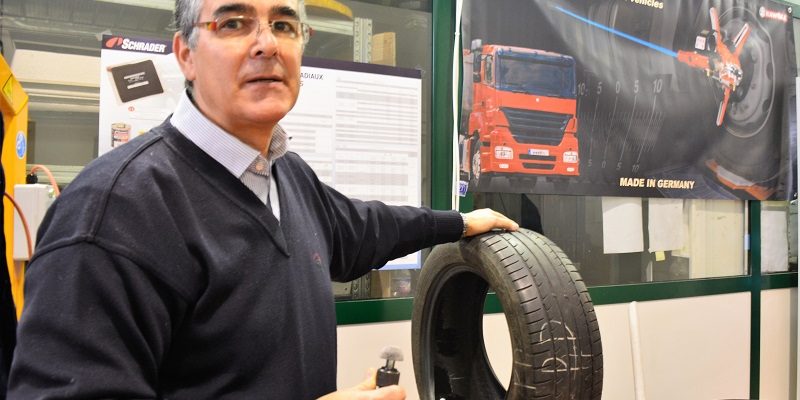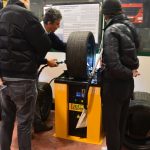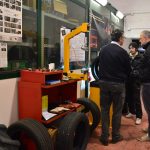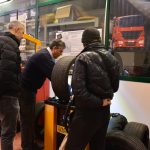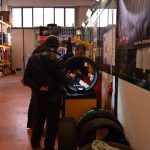Repairing tyres continues to be an activity in every tyre workshop. However, far from being a simple job, repairing tyres requires equipment, experience, preparation and constant training on the part of the tyre specialist, who assumes, before the law, responsibility for the
product on which he has worked.
One company that has made customer service the core of its entire business is the Padua-based LMV, which is divided into LMV Commercial, which sells machines and equipment for tyre dealers, and LMV Service, which deals exclusively with servicing and repairing equipment. In addition to offering for years the
repair of machines and equipment of all types and brands, LMV also offers customers courses on cold and hot repair of tyres of all segments.
“We have a real school of repair, with theoretical explanations and practical tests, and throughout the year we offer courses on repair, both hot and cold, to all those who want to grow,” says Paolo Giomaro, head of LMV’s consumable division. “Today it is particularly important to increase this type of service and others like it, which have been somewhat lost over time. Repairs, both on consumer tyres and on professional tyres, such as truck and agricultural tyres, can represent a business, but they are above all a very effective customer retention tool.”
Knowing how to repair tyres is, in LMV’s opinion, something that cannot be missing from every tyre shop, in order to demonstrate to the customer their specialisation and respect for the customer’s interests, who will have the perception that he has entrusted himself to a serious professional, who is not taking advantage of the situation to sell new products. The choice, when it comes to buying new tyres, should be automatic.
LMV has been working with this in mind for years and has set up an in-house workshop to assist customers with the repair of various equipment, jacks, lifts and screwdrivers. Tyre shops should be able to offer the same to their customers and LMV assists them in this.
“The repair is a necessary service, but one that must be performed in a workmanlike manner, following precise procedures defined by the tyre manufacturers,” explains Giomaro. “Tyres, which can be conventional or radial, are not all the same, and even in the car sector alone there are many different technologies that must be treated carefully, according to individual specifications: soundproof tyres, tyres containing gel or very thin new-generation layers. In short, one must always be very careful to follow the right rules, because whoever repairs the tyre automatically takes responsibility for it.
Among the tools to be consulted constantly are the product repairability tables, which define a safety range within which to work. Giomaro mentions, in particular, European repair certificates no. 109 for the truck and 108 for the car relating to repairs, which describe in detail what the damage is and establish the limits for reparability, such as, for example, penetrations in the carcass, multiple damage too close together, considerable deterioration of the inner lining, damage to the bead, detachment or stripping of the cords of the radial plies of the carcass, detachment of the top plies, circular cracks above the bead, etc.. Generally, repairability tables are provided by the manufacturers of the patches and, even in this case, care must always be taken to have the most recent and up-to-date version with the new products, which in many cases can be an improvement on the previous ones. “Today, for example, products made of Aramid, which offer greater repair capacity, safety and flexibility, especially in the agricultural segment, are gaining ground,” emphasises the LMV manager.
“Repair is a job, in the true sense of the word,” continues Giomaro, ” and tyre specialists have to know how to do it and have to put some passion into it, also because it is fundamental to customer loyalty. The first thing to do, in hot repair, is to open the tyre, then you have to stabilise the damage so that it doesn’t expand, check the table, and then proceed to close the tyre, with the patch applied, according to the instructions. Fitting tyres is a mechanical and repetitive job, while the beauty of repairing is that each operation is different from the other: you have to use your head and experience, because the more repairs you do the better you get.”
LMV therefore has a complete offer for repairs: from consumables to training and real-time consulting. Indeed, one only has to look at the whatsapp history on Giomaro’s mobile phone to discover all kinds of damage, about which customers seek advice. ” Whencustomers have doubts,” Giomaro concludes, “they send me a photo of the outside and inside of the tyre, the damage and its distance from the bead, to find out whether the repair can be carried out or not. We are pleased to be able to provide this kind of assistance, because we think it can, at the same time, solve our customer’s problem and demonstrate our professionalism”.
Source: PneusNews.it



